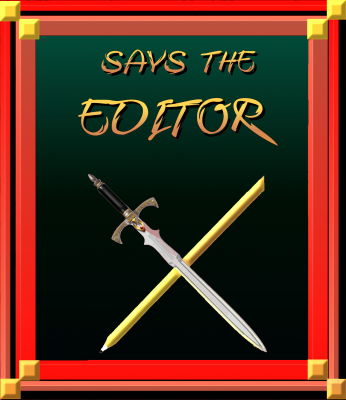May 6, 2021
 So last week, I brought up the idea of using the wrong details in the wrong places. I probably owe you a better example, but when you’re yanking something out of context–let alone writing it from scratch!–it’s hard to do.
So last week, I brought up the idea of using the wrong details in the wrong places. I probably owe you a better example, but when you’re yanking something out of context–let alone writing it from scratch!–it’s hard to do.
So much of editing and revising depends on context. On narrative voice, on the narrative character… There are so, so many things to consider.
Let me add one more to the pile, and I consider this one to be one of the few golden rules of fiction: The author should always know more about their characters than what appears on the page.
Why?
Because the deeper the well of your knowledge, the more authentic your characters appear on the page. You don’t need to tell us Justin is afraid of spiders. There may never be a spider in your entire manuscript. (Really. Spiders? Don’t appear all that often in fiction. Charlotte was a total unicorn, I’m tellin’ ya.) Justin’s fear may never be discussed, brought up, hinted at. But you, author, you know this simple detail: Justin’s got this fear.
And that, right there, makes him more complex. He’s not invincible. He’s not perfect. He screams worse than I did the day I saw a Daddy Long Legs on my front porch and climbed up my sister. (True story!)
Knowing this means that when you write about Justin, you yourself don’t think he’s invincible. You know he’s got a chink in the armor.
That knowledge means Justin can surprise you. He can show you another one.
Or maybe it means that the characters around him know, even though it’s, again, not voiced on the page. But they know their hero here? Will go running into the sunset, abandoning them to their fate if a spider appears. And that’ll change the way they interact with him–not necessarily in a negative way. Maybe in a better way. Maybe, instead of thinking he’s the be-all, end-all hero to solve the story’s problems, the supporting cast has more agency. They help protect Justin while he protects them.
This gives your characters depth, which in turn allows them to feel more real on the page. I can always tell when an author hasn’t done this work, when they don’t know much, or enough, about their characters.
Make the commitment. Do the off-the-page work. Heck, buy yourself a pretty pen*, fill it with pretty ink, grab some paper, and brainstorm. Create your character’s personal details. Maybe be like me and use different pens and different colors so your ideas don’t run into each other, and each one instead stands out, visible and ready to be referenced.
Whatever your choose. Do the work. It’ll pay off in the end, I promise.
And, as always, remember: If you need my editorial help, I’m here! When my comments are more directly pointed at your own words, you’ll get it. I promise.
*I, myself, now own a TWSBI Eco and can vouch for what a nice pen it is!